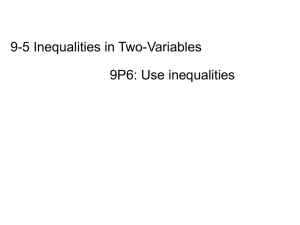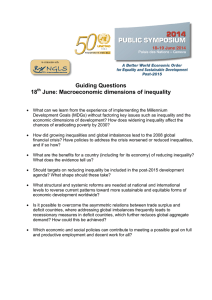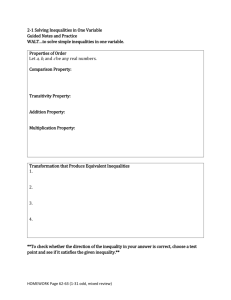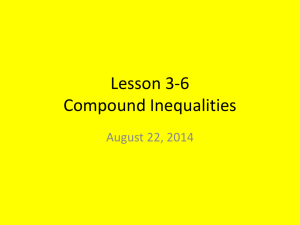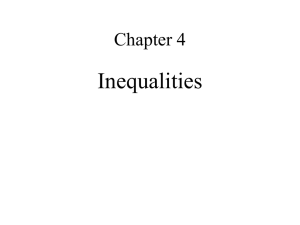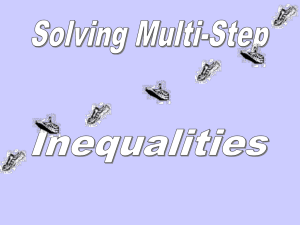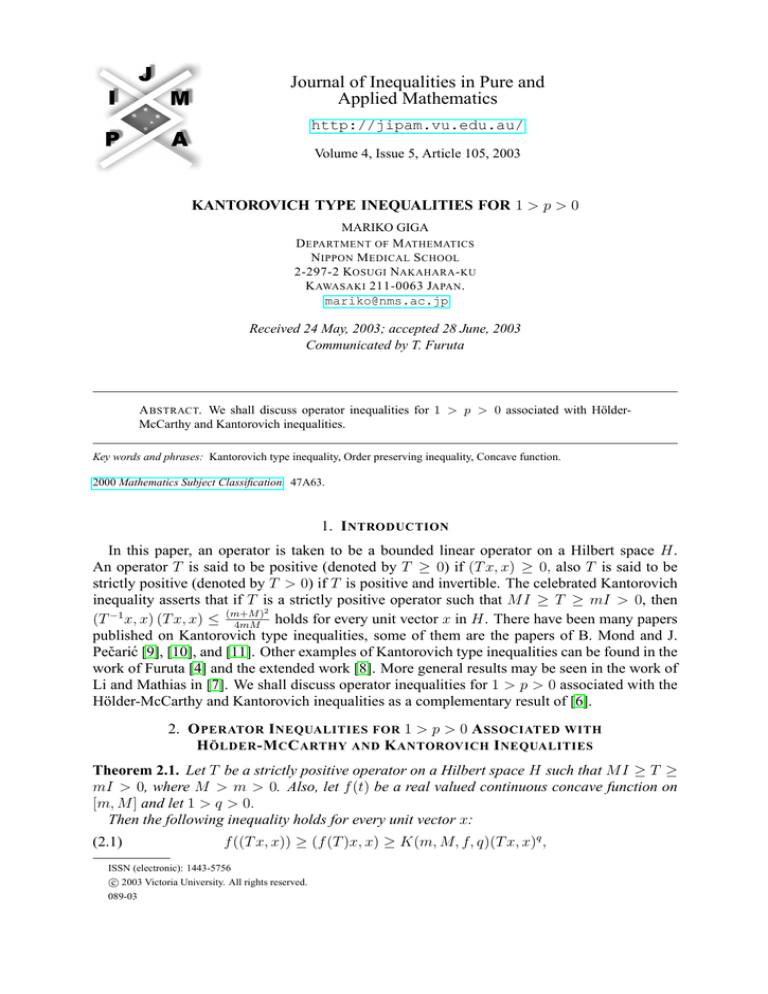
Journal of Inequalities in Pure and
Applied Mathematics
http://jipam.vu.edu.au/
Volume 4, Issue 5, Article 105, 2003
KANTOROVICH TYPE INEQUALITIES FOR 1 > p > 0
MARIKO GIGA
D EPARTMENT OF M ATHEMATICS
N IPPON M EDICAL S CHOOL
2-297-2 KOSUGI NAKAHARA - KU
K AWASAKI 211-0063 JAPAN .
mariko@nms.ac.jp
Received 24 May, 2003; accepted 28 June, 2003
Communicated by T. Furuta
A BSTRACT. We shall discuss operator inequalities for 1 > p > 0 associated with HölderMcCarthy and Kantorovich inequalities.
Key words and phrases: Kantorovich type inequality, Order preserving inequality, Concave function.
2000 Mathematics Subject Classification. 47A63.
1. I NTRODUCTION
In this paper, an operator is taken to be a bounded linear operator on a Hilbert space H.
An operator T is said to be positive (denoted by T ≥ 0) if (T x, x) ≥ 0, also T is said to be
strictly positive (denoted by T > 0) if T is positive and invertible. The celebrated Kantorovich
inequality asserts that if T is a strictly positive operator such that M I ≥ T ≥ mI > 0, then
)2
(T −1 x, x) (T x, x) ≤ (m+M
holds for every unit vector x in H. There have been many papers
4mM
published on Kantorovich type inequalities, some of them are the papers of B. Mond and J.
Pečarić [9], [10], and [11]. Other examples of Kantorovich type inequalities can be found in the
work of Furuta [4] and the extended work [8]. More general results may be seen in the work of
Li and Mathias in [7]. We shall discuss operator inequalities for 1 > p > 0 associated with the
Hölder-McCarthy and Kantorovich inequalities as a complementary result of [6].
2. O PERATOR I NEQUALITIES FOR 1 > p > 0 A SSOCIATED WITH
H ÖLDER -M C C ARTHY AND K ANTOROVICH I NEQUALITIES
Theorem 2.1. Let T be a strictly positive operator on a Hilbert space H such that M I ≥ T ≥
mI > 0, where M > m > 0. Also, let f (t) be a real valued continuous concave function on
[m, M ] and let 1 > q > 0.
Then the following inequality holds for every unit vector x:
(2.1)
f ((T x, x)) ≥ (f (T )x, x) ≥ K(m, M, f, q)(T x, x)q ,
ISSN (electronic): 1443-5756
c 2003 Victoria University. All rights reserved.
089-03
2
M ARIKO G IGA
where K(m, M, f, q) is defined by
K(m, M, f, q)
q
(mf (M ) − M f (m)) (q − 1)(f (M ) − f (m))
B1 =
if Case 1 holds;
(q
−
1)(M
−
m)
q(mf
(M
)
−
M
f
(m))
f (m)
=
B2 =
if Case 2 holds;
q
m
f (M )
B3 =
if Case 3 holds,
Mq
where Case 1, Case 2 and Case 3 are as follows:
f (M )
f (m)
f (m)
f (M ) − f (m)
f (M )
<
and
q≥
≥
q,
M
m
m
M −m
M
f (m)
f (m)
f (M ) − f (m)
f (M )
Case 2: f (M ) > f (m),
<
and
q<
,
M
m
m
M −m
f (M )
f (m)
f (M )
f (M ) − f (m)
Case 3: f (M ) > f (m),
<
and
q>
.
M
m
M
M −m
Case 1: f (M ) > f (m),
Theorem 2.1 easily implies the following result.
Corollary 2.2. Let T be a strictly positive operator on a Hilbert space H such that M I ≥ T ≥
mI > 0, where M > m > 0. Also let 1 > p > 0 and 1 > q > 0, then we have
(T x, x)p ≥ (T p x, x) ≥ K(m, M, p, q)(T x, x)q ,
(2.2)
where K(m, M, p, q) is defined by
M p − mp
(1)
p−1
≥ M p−1 q;
K (m, M, p, q) if m q ≥
M −m
M p − mp
K(m, M, p, q) =
mp−q
if mp−1 q <
;
M −m
M p − mp
M p−q
if M p−1 q >
,
M −m
where K (1) (m, M, p, q) is defined by
(2.3)
K
(1)
(mM p − M mp )
(m, M, p, q) =
(q − 1)(M − m)
(q − 1)(M p − mp )
q(mM p − M mp )
q
.
3. P ROOFS OF THE R ESULTS IN §2
We state the following fundamental lemma before giving proofs of the results in §2.
Lemma 3.1. Let h(t) be defined by (3.1) on (0, ∞) for any real number q such that q ∈ (0, 1)
and any real numbers K and k, and M > m > 0
1
K −k
(3.1)
h(t) = q k +
(t − m) .
t
M −m
J. Inequal. Pure and Appl. Math., 4(5) Art. 105, 2003
http://jipam.vu.edu.au/
K ANTOROVICH T YPE I NEQUALITIES FOR 1 > p > 0
3
Then h(t) has the following lower bound BD(m, M, k, K, q) on [m, M ]:
BD(m, M, k, K, q)
q
(q
−
1)(K
−
k)
(mK
−
M
k)
B1 =
if Case 1 holds;
(q − 1)(M − m) q(mK − M k)
k
= B2 =
if Case 2 holds;
mq
B3 = K
if Case 3 holds,
Mq
where Case 1, Case 2 and Case 3 are as follows:
K
k
k
K −k
K
Case 1 K > k,
<
and q ≥
≥
q;
M
m
m
M −m
M
K
k
k
K −k
Case 2 K > k,
<
and q <
;
M
m
m
M −m
K
k
K
K −k
Case 3 K > k,
<
and
q>
.
M
m
M
M −m
Proof. We have that h0 (t1 ) = 0 when
t1 =
q
(mK − M k)
·
(q − 1)
(K − k)
and h00 (t1 ) =
−q(mK − M k)
,
(M − m)tq+2
1
and the conditions in Case 1 ensure that m ≤ t1 ≤ M , h00 (t1 ) > 0 and h(t) has the lower bound
B1 = h(t1 ) on [m, M ]. By the geometric properties of h(t), the conditions in Case 2 ensure
that 0 < t1 < m and h(t) has the lower bound B2 = h(m) on [m, M ]. Also the conditions in
Case 3 ensure that t1 > M and h(t) has the lower bound B3 = h(M ) on [m, M ].
Proof of Theorem 2.1. As f (t) is a real valued continuous concave function on [m, M ], we have
f (M ) − f (m)
(t − m) for any t ∈ [m, M ].
M −m
By applying the standard operational calculus of positive operator T to (3.1), since M ≥
(T x, x) ≥ m, we obtain for every unit vector x
(3.2)
(3.3)
f (t) ≥ f (m) +
Multiplying by (T x, x)−q
(3.4)
f (M ) − f (m)
((T x, x) − m).
M −m
on both sides of (3.2), we have
(f (T )x, x) ≥ f (m) +
(T x, x)−q (f (T )x, x) ≥ h((T x, x)),
where
−q
h(t) = t
f (M ) − f (m)
f (m) +
(t − m) .
M −m
Then we obtain
(3.5)
(f (T )x, x) ≥
min h(t) (T x, x)q .
m≤t≤M
Putting K = f (M ) and k = f (m) in Lemma 3.1, so that the latter inequality of (2.1) follows
by (3.5) and Lemma 3.1 and the former inequality in (2.1) follows by the Jensen inequality
(for examples, see [1], [2], [3] and [7]) since f (t) is a concave function. Whence the proof is
complete by Lemma 3.1.
J. Inequal. Pure and Appl. Math., 4(5) Art. 105, 2003
http://jipam.vu.edu.au/
4
M ARIKO G IGA
Proof of Corollary 2.2. Put f (t) = tp for p ∈ (0, 1) in Theorem 2.1. As f (t) is a real valued
continuous concave function on [m, M ], M p > mp and M p−1 < mp−1 hold for any p ∈ (0, 1),
)
< f (m)
for any p ∈ (0, 1).
that is, f (M ) > f (m) and f (M
M
m
Whence the proof of Corollary 2.2 is complete by Theorem 2.1.
4. A PPLICATION
OF
C OROLLARY 2.2 TO K ANTOROVICH T YPE O PERATOR
I NEQUALITIES
Theorem 4.1. Let A and B be two strictly positive operators on a Hilbert space H such that
M1 I ≥ A ≥ m1 I > 0 and M2 I ≥ B ≥ m2 I > 0, where M1 > m1 > 0 and M2 > m2 > 0 and
A ≥ B.
(a) If p > 1 and q > 1, then the following inequality holds:
K(m2 , M2 , p, q)Aq ≥ B p ,
where K(m1 , M1 , p, q) is defined by
M2p − mp2
p−1
(1)
K (m2 , M2 , p, q) if m2 q ≤
≤ M2p−1 q;
M2 − m 2
M2p − mp2
p−q
p−1
K(m2 , M2 , p, q) =
;
m2
if m2 q >
M2 − m 2
M p − mp2
M2p−q
if M2p−1 q < 2
.
M2 − m 2
(b) If p < 0 and q < 0, then the following inequality holds:
K(m1 , M1 , p, q)B q ≥ Ap ,
where K(m1 , M1 , p, q) is defined by
M1p − mp1
p−1
(1)
K (m1 , M1 , p, q) if m1 q ≤
≤ M1p−1 q;
M1 − m 1
M1p − mp1
p−1
K(m1 , M1 , p, q) =
mp−q
if
m
q
>
;
1
1
M1 − m 1
M p − mp1
M1p−q
if M1p−1 q < 1
.
M1 − m 1
(c) If 1 > p > 0 and 1 > q > 0, then the following inequality holds:
(4.1)
Ap ≥ K(m1 , M1 , p, q)B q ,
M1p − mp1
p−1
(1)
K
(m
,
M
,
p,
q)
if
m
q
≥
≥ M1p−1 q;
1
1
1
M
−
m
1
1
p
M1 − mp1
p−q
p−1
K(m1 , M1 , p, q) =
m1
if m1 q <
;
M1 − m 1
M p − mp1
M1p−q
if M1p−1 q > 1
,
M1 − m 1
where K (1) (m, M, p, q) in (a), (b) and (c) is defined in (2.3).
Proof. We have only to prove (c) since (a) and (b) are both shown in [6].
J. Inequal. Pure and Appl. Math., 4(5) Art. 105, 2003
http://jipam.vu.edu.au/
K ANTOROVICH T YPE I NEQUALITIES FOR 1 > p > 0
5
Proof of (c). For every unit vector x, 1 > p > 0 and 1 > q > 0, we have
(Ap x, x) ≥ K(m1 , M1 , p, q)(Ax, x)q
q
by Corollary 2.2
≥ K(m1 , M1 , p, q)(Bx, x)
since A ≥ B > 0 and 1 > q > 0
≥ K(m1 , M1 , p, q)(B q x, x)
by the Hölder-McCarthy inequality, since 1 > q > 0
so that (4.1) is shown and the proof is complete.
Corollary 4.2. Let A and B be two strictly positive operators on a Hilbert space H such that
M1 I ≥ A ≥ m1 I > 0 and M2 I ≥ B ≥ m2 I > 0, where M1 > m1 > 0, M2 > m2 > 0 and
A ≥ B.
(i) If p > 1, then the following inequality holds
K (1) (m2 , M2 , p)Ap ≥ B p .
(ii) If p < 0, then then the following inequality holds
K (1) (m1 , M1 , p)B p ≥ Ap ,
where
K
(1)
(mM p − M mp )
(m, M, p) =
(p − 1)(M − m)
(p − 1)(M p − mp )
p(mM p − M mp )
p
.
Proof of Corollary 4.2. Since tp is a convex function for p > 1 or p < 0, and tp is a concave
function for 1 > p > 0, we have only to put p = q in Theorem 4.1.
Remark 4.3. We remark that (i) of Corollary 4.2 is shown in [4, Theorem 2.1] and Theorem 1
in §3.6.2 of [5]. In the case p = q ∈ (0, 1), the result (4.1) may be given as follows: A ≥ B > 0
ensures that Ap ≥ B p ≥ K(m1 , M1 , p, p)B p for all p ∈ (0, 1). In fact, the first inequality
follows by the Löwner-Heinz inequality and the second one holds since K(m1 , M1 , p, p) ≤ 1
which is derived from (2.2).
Remark 4.4. We remark that for p > 1 and q > 1, K (1) (m, M, p, q) can be rewritten as
q
(mM p − M mp ) (q − 1)(M p − mp )
(1)
K (m, M, p, q) =
(q − 1)(M − m) q(mM p − M mp )
(q − 1)q−1
(M p − mp )q
=
qq
(M − m)(mM p − mp )q−1
and in fact this latter simple form is in [6].
R EFERENCES
[1] T. ANDO, Concavity of certain maps on positive definite matrices and applications to Hadamard
products, Linear Alg. and Appl., 26 (1979), 203–241.
[2] M.D. CHOI, A Schwarz inequality for positive linear maps on C ∗ -algebras, Illinois J. Math, 18
(1974), 565–574.
[3] C. DAVIS, A Schwarz inequality for convex operator functions, Proc. Amer. Math. Soc., 8 (1957),
42–44.
[4] T. FURUTA, Operator inequalities associated with Hölder-McCarthy and Kantorovich inequalities,
J. Inequal. and Appl., 2 (1998),137–148.
[5] T. FURUTA, Invitation to Linear Operators, Taylor & Francis, London, 2001.
[6] T. FURUTA AND M. GIGA, A complementary result of Kantorovich type order preserving inequalities by J.Mićić-J.Pečarić-Seo, to appear in Linear Alg. and Appl.
J. Inequal. Pure and Appl. Math., 4(5) Art. 105, 2003
http://jipam.vu.edu.au/
6
M ARIKO G IGA
[7] C.-K. LI AND R. MATHIAS, Matrix inequalities involving positive linear map, Linear and Multilinear Alg., 41 (1996), 221–231.
[8] J. MIĆIĆ, J. PEČARIĆ AND Y. SEO, Function order of positive operators based on the MondPečarić method, Linear Alg. and Appl., 360 (2003), 15–34.
[9] B. MOND
405–420.
AND
J. PEČARIĆ, Convex inequalities in Hilbert space, Houston J. Math., 19 (1993),
[10] B. MOND AND J. PEČARIĆ, A matrix version of Ky Fan Generalization of the Kantorovich inequality, Linear and Multilinear Algebra, 36 (1994), 217–221.
[11] B. MOND AND J. PEČARIĆ, Bound for Jensen’s inequality for several operators, Houston J.
Math., 20 (1994), 645–651.
J. Inequal. Pure and Appl. Math., 4(5) Art. 105, 2003
http://jipam.vu.edu.au/


